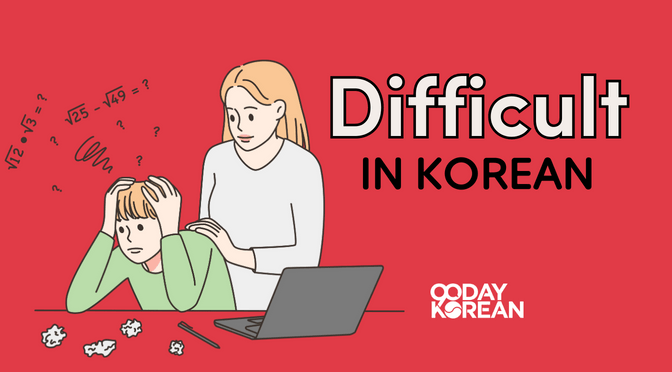In this lesson, we will make it easy for you to learn how to say “difficult” in Korean.
What is the most difficult problem that you’ve faced? Perhaps learning Korean or another language sometimes feels difficult for you. However, learning the vocabulary for “difficult” in Korean doesn’t have to feel tough for you!
You’ll even get to go through some sample sentences to help you practice using the word. In addition, we may even have some additional vocabulary in store for you today. Let’s get to learning, shall we?
How to say “difficult” in Korean
There are a few ways to say “difficult” in Korean, depending on the context. The primary way for it is the descriptive verb 어렵다 (eoryeopda). Its literal translation is “hard.”
The basic way to use it is 어려워요 (eoryeowoyo), and its casual form is 어려워 (eoryeowo). Its adjective form is 어려운 (eoryeoun). If you want to turn it into a negative, just add “안” in front of the word. You can, of course, use it in both future and past tenses as well.
Note that this word only describes that something is hard in the sense that something is difficult. It is the word to use when you want to describe the level of difficulty of something. Below you can find the vocabulary to use in other contexts for “difficult.”
Sample sentences
한국어 배우는 것은 쉽지만 일본어 배우는 것은 너무 어려워요. (hangugeo baeuneun geoseun swipjiman ilboneo baeuneun geoseun neomu eoryeowoyo.)
Although learning Korean is easy, learning Japanese is really difficult.
어려운 게임을 해 볼래요? (eoryeoun geimeul hae bollaeyo?)
Do you want to try playing a difficult game?
오늘 어려운 결정을 해야 했어. (oneul eoryeoun gyeoljeongeul haeya haesseo.)
I had to make a difficult decision today.
Below are different words that mean “difficult” in the Korean language.
“Troublesome” in Korean
A similar Korean word that means “difficult” is 힘들다 (himdeulda). Specifically, its meaning is something is strenuous, demanding, or troublesome.
It can be used in situations where you feel something is so difficult or hard that it is crushing you. This Korean verb has its origins in the term 힘이 들다 (himi deulda), which means that strength (or effort) is required. Its adjective form is 힘든 (himdeun).
힘 (him) literally translates as strength. Therefore, you can additionally use it when some physical activity, such as swimming or biking, is hard or tough, or tiring.
Both 힘들다 (himdeulda) and 어렵다 (eoryeopda) are great descriptive verbs at times when you want to express that you are struggling in some way.
Sample sentences
요즘 가족관계가 아주 힘들어요. (yojeum gajokgwangyega aju himdeureoyo.)
Lately, family relations have been so strenuous.
우와, 그 운동수업은 정말 힘들었어. (uwa, geu undongsueobeun jeongmal himdeureosseo.)
Wow, that workout session was very tough.
이 힘든 숙제를 끝낼 수 없을 것 같아요. (i himdeun sukjereul kkeunnael su eopseul geot gatayo.)
I can’t seem to be able to finish this tough homework.
“Fussy” in Korean
까다롭다 (kkadaropda) is a descriptive verb you can use to express that someone is being difficult or fussy about something. Its adjective form is 까다로운 (kkadaroun).
Sample sentence
내 여자친구가 아주 식성이 까다로운 사람이야. (nae yeojachinguga aju sikseongi kkadaroun saramiya.)
My girlfriend is a very fussy eater.
Wrap Up
Now, tell us: did you find this lesson difficult? We hope you did not and that instead, you simply easily learned how to say the word difficult in Korean. Do you, in general, find it easy or difficult to learn Korean? Thankfully we have some tips for you on how to make learning Korean easy – or at least easier!




